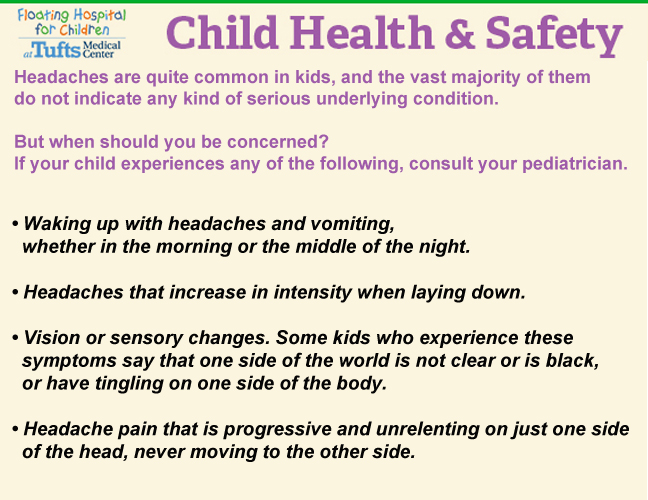Kids and Headaches: Sorting Through the Pain
By JOHN WOLFSON, Tufts Medical Center Staff
Not long ago, a 12-year-old girl and her mother came to see Anthony Rodrigues, MD, a pediatric neurologist at Floating Hospital who specializes in pain conditions such as headaches, migraines, and what's known as chronic regional pain syndrome.
The girl had been experiencing daily headaches for some time, but her pediatrician had been unable to pinpoint the cause of the problem. So he referred her to Dr. Rodrigues, who now stood before a mother and daughter fearing the worst—a brain tumor, perhaps, or meningitis.
In situations like these, Dr. Rodrigues begins with a quick series of questions to determine the patient's "headache hygiene," his term for how well the patient sleeps, eats and exercises.
It didn't take him long to figure out that the girl's headaches were most likely the result of her not doing any of those things particularly well. She was skipping breakfast, drinking coffee, and sleeping just six hours a night.
"Why are you up at midnight each night?" Dr. Rodrigues asked the girl.
"I'm just lying in bed," she responded.
"She's on her phone!" her mother interjected.
Dr. Rodrigues was not surprised by the exchange. Unfortunately, many of the elements of modern childhood—phones and tablets, jam-packed schedules, and stress related to school or the family—are at odds with proper headache hygiene.
"Quite simply," says Dr. Rodrigues, "there are just a lot more demands on kids these days than there used to be. You tell a kid that they need to get to bed earlier and the first thing they say is, 'Well then how am I going to get my homework done? I need to be up late on the computer.'"
Little wonder, then, that headaches are a fairly normal part of childhood these days. "The frequency of headaches among children is quite high," says John Gaitanis, MD, chief of pediatric neurology at Floating. "Most kids will experience headaches—a very high percentage will have occasional occurrences." Indeed, according to the American Academy of Pediatrics, headaches are one of the three most common reasons that children go to the doctor.
When kids see their local pediatrician for headaches, Dr. Gaitanis says the doctor's main goal is to check for signs of the most serious potential causes: tumors, meningitis, concussion, or problems with the neck or jaw.
"After that, pediatricians may not be comfortable with exactly what should come next," Dr. Gaitanis says. "In those instances, they often refer their patients to a neurologist."
Once a child has been referred, Dr. Gaitanis and Dr. Rodrigues begin by categorizing the headaches as primary or secondary. Primary headaches do not have an underlying cause. Migraine headaches, for instance, have no underlying cause, though they do have triggers. In certain children, Dr. Gaitanis says, sleep disturbance, hot weather, dehydration, and certain foods can all set off migraine headaches.
Secondary headaches, on the other hand, do have underlying causes. The good news, Dr. Gaitanis says is that the most severe of those underlying causes are rare. "Brain tumors and other serious problems are very rarely the cause of a child's headaches," he says. "In fact, something like Lyme disease would be a more common cause."
Dr. Gaitanis says that primary headaches are vastly more common than secondary ones, and that the kids who suffer from them "have very active minds. They're very high energy. They have trouble falling asleep because they can't turn their brains off." For these children, the treatment includes improved nutrition and exercise, but there is also often a psychological component. "They need to learn to turn down the anxiety so they can sleep," Dr. Gaitanis says.
Another often overlooked treatment for chronic headaches are certain vitamins, minerals and herbal supplements. Dr. Rodrigues says that increased intake of both magnesium and Riboflavin (Vitamin B2) can help with headaches. And then there are the herbs butterber (part of the sunflower family) and feverfew, which Dr. Rodrigues says have been shown in head-to-head studies to reduce headache frequency.
"My goal is for patients to be on the least amount of medication that will still result in the best headache relief," Dr. Rodrigues says. That's because over-the-counter pain relievers can actually be counterproductive when it comes to dealing with chronic pain such as regular headaches. "Tylenol and similar painkillers should be used for acute pain," Dr. Rodrigues says. "If you take them for chronic pain, you run the risk of what we call M.O.H., or medication overuse headaches. That is, taking too much of them can actually create headaches. Once you stop taking these medications, you can get what are known as rebound headaches."
In the end, says Dr. Rodrigues, the best way to treat headaches is to try to prevent them from happening in the first place. That means proper headache hygiene. And that, he says, can be harder than it sounds these days. Never mind eating right and exercising regularly, just getting kids to put down the phone and get to bed can be a real struggle for even the most attuned parents.
"Telling your kids it's time to log off of social media or stop watching television can be difficult – it can feel like you are robbing them of their identity or taking away some of their free time. But these behavior modifications are very important to a child's health overall and could be the first step in moving beyond headaches."
To connect with Drs. Gaitanis and Rodrigues for any headache or neurologic concerns, please call 617-636-8100.

The above content is provided for educational purposes by Tufts Medical Center. It is free for educational use. For information about your own health, contact your physician.Posted May 2017